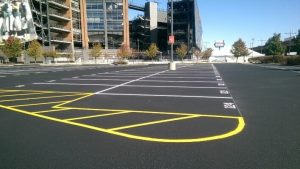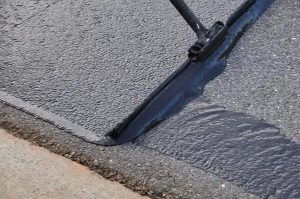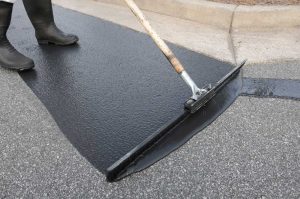Litter isn’t just bad for the environment—it can also create a safety hazard in your parking lot. Taking a few simple steps to prevent litter on your property can improve your customers’ perceptions of your business and better protect your space. Use these three simple tips to prevent litter in your parking lot this year. Read More→
Archive for: Seal Coating

Many business and property owners are surprised to learn that they can be held responsible for injuries and accidents that occur in their parking lot. Parking lots and asphalt are subject to everyday wear and tear, and this usage can result in dangerous conditions. The following are some of the most common parking lot issues that can cause injuries or collisions. Read More→
Soon, the temperatures will drop too low for property owners near Burlington and Camden County to arrange for asphalt sealcoating. If they get this essential service done in the fall, however, then they will enjoy stronger, smoother, and more beautiful surfaces all season long. Read More→
As fall approaches, asphalt sealcoating companies in Mercer County and throughout the Northeast begin to fill up with appointments as businesses rush to repair and protect their parking lots before the winter hits. Many of these companies are not prepared for the heavy workload, which can leave you with delayed appointments and rushed service. Read More→
The summer is the perfect time to contact the best asphalt maintenance company near Mercer County, NJ—Asphalt Pavement Solutions. In fact, we’ve recently added the Pavement Saver II to our equipment collection to get jobs done faster and better! This state-of-the-art, three-in-one machine is capable of spray bar application, spray wand application, and squeegee application.
To learn more about the the Pavement Saver II and/or our asphalt sealcoating services available in Burlington County, NJ, call us today at 1-856-288-1656.

Alternatives – Sealcoating, Asphalt Resurfacing or Repaving
When Should You Sealcoat?
Sealcoating should be applied early in the life of your asphalt pavement. Your asphalt contractor can advise you on the exact schedule you need to follow, but because the pavement needs to cure first, sealcoating is not normally applied until at least 90 days after the asphalt is installed. Depending on the traffic and loads to which your asphalt pavement is subjected, you will need to have fresh sealcoating applied every 18 to 36 months.
Asphalt sealcoating is your pavement’s first line of defense against deicing chemicals, automotive fluids and UV radiation. If the color of your asphalt pavement has faded, sealcoating can bring back the deep, rich color of newly applied asphalt. It can also smooth out minor surface imperfections to give the pavement a more even appearance. However, because sealcoating cannot fill large breaks in the pavement, potholes or cracks should be repaired before sealcoating is applied.
When Should You Resurface?
When you have your asphalt pavement resurfaced, the contractor will apply a new layer of asphalt directly on top of existing pavement. Cracks or potholes will need to be repaired first to prevent the deterioration from continuing beneath the surface and to prevent damages from “telegraphing” through. In addition, the pavement’s supporting foundation should be in good condition. Resurfacing can be appropriate if the pavement has damage over 25 percent to 50 percent of its surface.
When Should You Repave?
Repaving involves tearing out the old pavement, rebuilding the foundation and installing new asphalt. It is the most costly option as well as the one that will require the most time to complete. If the surface or the foundation has suffered extensive damage, repaving may be your only option.
Let Us Help
Asphalt Pavement Solutions is an asphalt maintenance paving contractor that has been serving customers in New Jersey, Delaware and Pennsylvania since 1983. We would be happy to help you decide on the best way to handle your asphalt maintenance and repair needs. We offer sealcoating, asphalt paving, parking lot striping, asphalt patching and crack repair, car stops, inlet repair, bollard installation and many other asphalt-related services. Our crews are dedicated to delivering quality work at reasonable rates. If you would like to request a free estimate, you can complete the online form or call 1-800-559-SEAL or 1-856-461-1710. See Recent Blog’s Below –

Why Sealcoating Works
1. Sealcoating reduces damages caused by ultraviolet radiation. You have probably seen ads for sunscreens that discuss using products to block UV rays to prevent premature aging. Ultraviolet radiation can also affect how your asphalt ages. Exposure to the sun can fade asphalt from a rich black to a washed-out gray, making the pavement less appealing. UV rays can also cause the asphalt to become overly dry, leading to premature deterioration.
2. Sealcoating creates a barrier against automotive fluids. Sooner or later, any pavement on which vehicles drive or park will encounter a car that leaks oil, transmission fluid, coolant, gasoline or brake fluid. These corrosive chemicals can soften asphalt, making it impossible for the pavement to bear the weight of traffic without crumbling or cracking. Sealcoating helps keep chemical spills from penetrating to the asphalt.
3. Sealcoating increases the flexibility of asphalt pavement. One of the secrets to the longevity of asphalt pavement is its flexibility. When subjected to weight, asphalt “gives” just enough to absorb the stress and spring back. Without sealcoating, asphalt can become dry and brittle. Brittle asphalt is far more likely to crack or crumble. Sealcoating helps asphalt retain the flexibility it needs to withstand the loads placed upon it.
4. Sealcoating makes it easier to maintain and clean the pavement. The smooth barrier provided by sealcoating offers less resistance when sweeping or power washing the pavement, so superior results can be obtained with less effort. Sealcoating also accelerates the time it takes ice and snow to melt, which makes the pavement safer for your visitors. This reduces the dangers of damage to your asphalt from water penetration as well.
Sealcoating can help you achieve the best return on your asphalt investment. If you make repairs (such as having cracks filled) on a timely basis and have sealcoating applied regularly, your pavement should have a lifespan that spans the decades.
Asphalt Pavement Solutions has been sealcoating our customers’ asphalt surfaces since 1983. We offer maintenance programs to help you keep your pavement in top condition, new pavement installation, parking lot striping, asphalt repair and more throughout Pennsylvania, New Jersey, Delaware and Maryland. You can use our online form to request a free quote, or call us at 1.856.461.1710 or 1.800.559.SEAL.
Wet sealant can be quite slippery, but you should not allow pedestrians or vehicles on the pavement until the sealant has dried. Once it is dry, it should not be slippery — unless the contractor has failed to mix the sealant properly.
Will Sealcoat Make The Pavement Slippery – Safety Is Important!
Most contractors use a variety of sealants that must be mixed before application. Each manufacturer specifies how much water and how much silica sand needs to be added to make each type of sealant. The ratios of sealant mix, water, sand, and additives must be correct or the sealcoating can not only be slippery, but it can also fail very quickly.
The sand is a critical part of the sealant mix. It is what provides the additional traction needed to prevent a slick surface. If the mix contains excessive water, it cannot hold enough sand to prevent the surface from being slippery. The slickness will be even greater when it rains or when dew collects on the pavement. Business owners — and even homeowners — can be exposed to liability risks as a pedestrian could slip and fall or a car could skid and be involved in an accident.
If the pavement is on an incline, it is also possible for asphalt contractors to take additional steps to ensure good traction. A common practice when sealcoating steep pavements is to broadcast sand over the top of the just-applied sealant. However, this step is often unnecessary on pavement that is relatively flat, such as most parking lots.
In addition to improving traction, the sand that is mixed into the sealant offers other benefits. It extends the life of the sealant by increasing the percentage of solid material in the mix. It helps to reduce glare by giving the surface more of a matte finish. It can also help conceal minor scratches or other imperfections to improve the overall appearance of the pavement.
Asphalt Pavement Solutions has been providing customers with exemplary asphalt-related services since 1983. In addition to sealcoating, we also offer paving, crack filling, striping, signage installation and pothole repair. We cover the entire state of Pennsylvania as well as New Jersey and Delaware. You can use our convenient online form to request your free quote, or call us at 1-800-559-SEAL or 1-856-461-1710.

How Weather Effects The Longevity of Pavement
Climate plays an important part in the premature failing of asphalt pavement. In dry, hot areas, the pavement may become brittle. In humid, wet areas, moisture can accumulate beneath the pavement and weaken it. Water beneath the pavement, which can occur from leaking pipes or a rising water table, can weaken the pavement so much that it can no longer support traffic. Improper drainage of surface water, such as from heavy rains or runoff, can also cause the pavement to fail. Whether it is on the surface or below the pavement, water can freeze, expanding any cracks and contributing to premature failure.
How Neglect Effects The Longevity of Pavement
However, the most common reason for having to replace asphalt pavement prematurely is neglect. Filling and sealing cracks as they appear protects the pavement structure and base from water accumulating under the pavement. Repairing areas that are showing signs of fatigue prior to their failure can prevent more costly repairs later. Filling potholes while they are still small is another way of avoiding more expensive fixes.
Proper Care Maximizes Pavement Life
One of the best methods of protecting asphalt pavement is with asphalt sealcoating. Two coats are normally applied to protect asphalt from the damage that the sun, salt, oil, gas and water can cause. In addition, sealcoating gives the asphalt a deep, black finish that enhances its appearance. Learn more about our asphalt sealcoating service.
Asphalt rejuvenator enhances the look of pavement while protecting the asphalt. Rejuvenator replenishes the oils found in asphalt. As a result, the asphalt is more resilient and less prone to cracking. One application can last for three to five years, and in some instances, the pavement can last twice as long.
Contact Asphalt Pavement Solutions at 800-559-SEAL or fill out the Free Job Quote form to get started. We specialize in asphalt sealcoating in Philadelphia, throughout Pennsylvania, New Jersey, and Delaware!
About Us
Asphalt Pavement Solutions was established in the spring of 1983 by its current managing partner. It started out as a PT weekend residential driveway business which took hold very fast. By 1984 APS became a full-time asphalt maintenance company specializing in sealcoating, hot rubberized crack sealing and line striping.
Contact Us
Synergy Business Enterprises LLC
T/A Asphalt Pavement Solutions
P.O. Box 1439
Delran, NJ 08075
Call Us:
856.461.1710
Copyright © 2024. Asphalt Pavement Solutions. All rights reserved.

